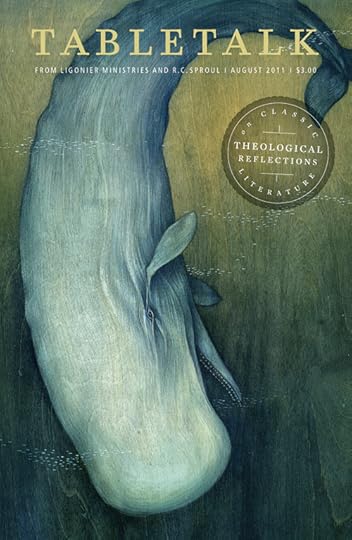R.C. Sproul's Blog, page 575
August 5, 2011
$5 Friday: John, Life of Christ & More
Find $5 Friday resources today on John's gospel, the life of Christ, reformed theology, holiness, covenants and more. Sale starts Friday at 8 a.m. and ends Saturday at 8 a.m. EST.

August 4, 2011
Get Dr. Sproul's Overview of Philosophy for a Donation of Any Amount
To understand the culture in which we live, you need to be familiar with the ideas that have shaped it. In Ligonier’s overview series, The Consequences of Ideas, R.C. Sproul traces the contours of Western philosophy throughout history and shows how our culture evolved to what it is today. From ancient Greek thinkers like Socrates, Plato, and Aristotle to Christian philosophers such as Augustine, Anselm and Aquinas to the shapers of modern thought such as Hume, Kant and Nietzsche, Dr. Sproul demonstrates the consequences of each of these and other important thinkers’ ideas on world events, theology, the fine arts and culture, as well as our everyday lives.
 Today you can get this CD series for a donation of any amount. Some of the messages include:
Today you can get this CD series for a donation of any amount. Some of the messages include:
Thales
Monism and Pluralism
Socrates
Plato (Parts 1 & 2)
Aristotle (Parts 1 & 2)
Augustine
Aquinas (Parts 1 & 2)
Descartes
Pascal
The Enlightenment Philosophers (Parts 1 & 2)
Kant (Parts 1 & 2)
Marx and Cornte
Kierkegaard
Nietzsche
Modern Philosophers
Offer valid through today, August 4th. Donate Now .

The Faces of Ministry at Ligonier: Dr. Keith Mathison
Keith was born and raised near Houston, Texas. After becoming a Christian following graduation from high school, he was baptized in October 1986. A month after graduating from Houston Baptist University in 1990, he was married, and a few months later he began studies at Dallas Theological Seminary. While at Dallas, Keith encountered Dr. John Gerstner’s critique of dispensationalism and began to study the issue more in depth. Also while at Dallas Seminary, he was able to attend the annual W.H. Griffith Thomas lectures, given that year by Dr. R.C. Sproul. Through his study, Keith eventually became convinced that dispensationalism was biblically indefensible and transferred to Reformed Theological Seminary in Orlando where Dr. Sproul was then teaching.
 Keith serves in two different capacities at Ligonier. He is an Associate Editor of Tabletalk as well as Professor of Biblical Studies with the Bible College. He began working at Ligonier part-time in March 1996, becoming full time a couple of months later in July. In April 2000, he was asked to develop and implement a course of study for a certificate in theological studies, which eventually became the certificate program offered by Ligonier Academy today. In September 2001, Keith began working as an editorial assistant with Tabletalk magazine, and in July 2003 he became an associate editor. In 2008, he was asked to help develop the curriculum for what is now Reformation Bible College. Keith says that he enjoys working at Ligonier “because of the emphasis on providing solid biblical and theological teaching to laymen. The scholarly level work is absolutely necessary, but it doesn’t do much good if the fruits of such study remain on dusty library shelves and are read by only a handful of specialists.”
Keith serves in two different capacities at Ligonier. He is an Associate Editor of Tabletalk as well as Professor of Biblical Studies with the Bible College. He began working at Ligonier part-time in March 1996, becoming full time a couple of months later in July. In April 2000, he was asked to develop and implement a course of study for a certificate in theological studies, which eventually became the certificate program offered by Ligonier Academy today. In September 2001, Keith began working as an editorial assistant with Tabletalk magazine, and in July 2003 he became an associate editor. In 2008, he was asked to help develop the curriculum for what is now Reformation Bible College. Keith says that he enjoys working at Ligonier “because of the emphasis on providing solid biblical and theological teaching to laymen. The scholarly level work is absolutely necessary, but it doesn’t do much good if the fruits of such study remain on dusty library shelves and are read by only a handful of specialists.”
Keith also enjoys writing and has written, edited, and/or contributed to several volumes including Dispensationalism: Rightly Dividing the People of God?; Postmillennialism: An Eschatology of Hope; The Shape of Sola Scriptura; Given For You: Reclaiming Calvin’s Doctrine of the Lord’s Supper; and From Age to Age: The Unfolding of Biblical Eschatology.
He has been married for 21 years to his wonderful wife Tricia, and they have two wonderful children.

August 3, 2011
The Mighty Weakness of John Knox, from Reformation Trust Publishing

Do you feel little and frail, unable to accomplish the work God has set before you? Or maybe you feel like Moses who thought he was ill-equipped and under-qualified to bring God’s people out of Egypt: “Oh, my Lord, I am not eloquent . . . but I am slow of speech and of tongue” (Ex. 4:10). Either way, this practical biography of John Knox will serve as an encouragement and inspiration to you as you seek to carry out the work of the Kingdom.
The life of John Knox is a testament to God’s transforming power and his ability to show forth His strength in man’s weakness. More than just a biography of this prominent historical figure, The Mighty Weakness of John Knox also serves to examine how God Almighty took a man like John Knox, frail in body and diminutive in stature, and raised him up to become one of the most influential preachers in church history, causing a brushfire of revival and crushing the schemes of the devil.
Dr. George Grant, pastor of East Parish Presbyterian Church in Franklin, Tennessee, had this to say about the book:
“In the compass of this small volume, Douglas Bond somehow manages to corral all the mysterious paradoxes of John Knox: the thunderous pulpit and the closet intercessions, the soaring intellect and the humble home life, the boldness and the meekness, the might and the weakness. In other words, Bond has captured the very essence of this remarkable model for reformational ministry.”
Dr. Steven J. Lawson is the editor for the Long Line of Godly Men Profiles series. The Mighty Weakness of John Knox is the third book in the series, preceded by The Expository Genius of John Calvin and The Unwavering Resolve of Jonathan Edwards by Steven J. Lawson.
Read a Sample Chapter | Retail $16, Buy it for $12.80 here
About the Author
Douglas Bond is the head of the English Department at Covenant High School in Tacoma, Washington, where he teaches literature, writing, and history. He also lectures on literature and church history, and leads frequent historical study tours in Europe.
Graduating from St. Martin’s University, Bond holds a graduate degree in English education as well as a preliminary certificate in theology from Moore Theological College in Australia. He is an ordained ruling elder in the Presbyterian Church in America.
Bond has also written numerous works of fiction, many of them for young people, including the Crown & Covenant trilogy (focusing on a Covenanter family in Scotland) and the Faith & Freedom trilogy (following the same family to Revolutionary America). His fictional works also include a novel about John Calvin, The Betrayal. Among his nonfiction titles are Fathers and Sons Stand Fast in the Way of Truth and Fathers and Sons Hold Fast in a Broken World.
Bond and his wife, Cheryl, have four sons and two daughters. They live in Tacoma.
To learn more, visit his web site, www.bondbooks.net.

August 2, 2011
Writing for God's Glory
"Each of us was born with an imagination. Since creation, we have possessed the ability to form unseen images and original ideas in our minds — to visualize neverbefore seen characters and to craft intricately interwoven themes never experienced by anyone at any time in history. With our imaginations, we create stories and thus create imaginary worlds where there are heroes and villains, brave little hobbits, and great white whales. Some stories are historical, and some are fictional. Some stories are told to teach a lesson, and some are told merely to entertain. Throughout history, some stories have been passed down by oral tradition from generation to generation, and some stories have been penned and have thereby become part of the world’s library of literature."
This is how Burk Parsons begins his introduction to this month's issue of Tabletalk. Of course there is more to literature than great stories full of great characters teaching great lessons. "While everything written is a type of literature, not everything that is written is worth being read, much less duplicated, printed, and distributed. And although every story will find an audience, most stories have been forgotten and have never earned an audience beyond the story’s immediate generation and context. Few stories, however, have stood the test of time."
Keep reading "Writing for God's Glory."

August 1, 2011
Columns from Tabletalk Magazine, August 2011
The August edition of Tabletalk is out. This issue interacts with classical literature, exploring various biblical themes littered throughout great pieces such as Moby Dick and The Lord of the Rings. From Victor Hugo’s portrayal of law and grace in Les Mis to the remarkable choice of Faust in Christopher Marlowe’s play The Tragical History of Doctor Faustus, we investigate a variety of biblical themes found in each classic work. Contributors include R.C. Sproul, John Piper, Andy Naselli, Iain Murray, Tim Challies, and R.C. Sproul Jr.
 We do not post all of the feature articles or the daily devotionals from the issue, so you'll have to subscribe to get those. But for now, here are links to a few select columns and articles from this month:
We do not post all of the feature articles or the daily devotionals from the issue, so you'll have to subscribe to get those. But for now, here are links to a few select columns and articles from this month:
"Writing for God's Glory" by Burk Parsons
"The Unholy Pursuit of God in Moby Dick" by R.C. Sproul
"He Loves Me, He Really Loves Me" by Tim Challies
"Why 'Let Go and Let God' Is a Bad Idea" by Andy Naselli
"A Revival of Calvinism: An Interview with Iain Murray"
"Godly Boasting" by John Piper
*****
If you have not subscribed yet, you should. It's only $23 for a year, and $20 to renew. You save even more if you get a 2- or 3-year subscription (as little as $1.36 per issue). Special discounts for churches or businesses are available for those who want multiple copies of each issue. Start receiving Tabletalk by calling one of Ligonier Ministries' resource consultants at 800-435-4343 (8am-8pm ET, Mon-Fri) or subscribe online.

July 31, 2011
Twitter Highlights (7/31/11)
Here are some highlights from the various Ligonier Twitter feeds over the past week.

Ligonier Academy The courage of a storm-chaser, the gentleness of a nursing mother --attributes of a faithful elder.

Ligonier A just & holy God is never required to love a rebellious creation to the extent of extending mercy to it. -R.C. Sproul

Reformation Trust The more we learn about what [God] has done for us, the more our hearts should melt w/ greater allegiance toward Him. -Steven Lawson

Tabletalk Magazine "Holiness is nothing but the implanting, writing, and living out the gospel in our souls." — John Owen

Reformation Trust We are not to show sin mercy; sin is to be killed—outright. -Derek Thomas

Ligonier The greatest weakness in the church today is that the servants of God keep looking over their shoulder for the approval of men. -R.C. Sproul

Ligonier Faith is the fruit of regeneration, not the cause of it. -R.C. Sproul http://bit.ly/qTlshT
You can also find our various ministries on Facebook:
Ligonier Ministries | Ligonier Academy | Reformation Bible College
Reformation Trust | Tabletalk Magazine

July 29, 2011
John Calvin: Recommended Reading

John Calvin (1509–1564) was one of the leading figures among the second generation of Protestant Reformers. His writings were widely distributed throughout Europe and were instrumental in the spread of the Reformation. Books about Calvin and his thought continue to roll of the presses to this very day. The following is a list of some of the best works by and about John Calvin.
Works by John Calvin
John Calvin — Calvini Opera The complete works of Calvin in the original Latin are available in a number of places. The works are presently available online free at Calvin Seminary’s Library.
John Calvin — Institutes of the Christian Religion (1559) Calvin’s Institutes went through several editions before reaching its final form in 1559. The final edition is a Christian classic.
John Calvin — Commentaries (22 volumes). John Calvin was a master exegete, and his commentaries are among the few written in his day that are still consulted by contemporary writers. A gold mine for students of Scripture.
John Calvin — Tracts and Letters (7 volumes). The tracts and letters of John Calvin are an essential source for students of his theology. These volumes include Calvin’s debate with Cardinal Sadoleto, his side of the Eucharistic debate with the Lutherans, and his response to the Council of Trent, among other things. His letters provide a unique insight into his life and work as a reformer.
Biographies of John Calvin
All of the biographies below are worth reading, but each has it’s own strengths and weaknesses. Gordon’s biography is the most recent critical biography of Calvin, and it is outstanding in many ways, but the author’s theological biases do come through at times. Parker’s biography has stood the test of time. The biographies by Godfrey and Selderhuis are probably the most readable.
Alexandre Ganoczy — The Young Calvin
Bruce Gordon — Calvin
T.H.L. Parker — John Calvin: A Biography
Herman J. Selderhuis — John Calvin: A Pilgrim’s Life
W. Robert Godfrey — John Calvin: Pilgrim and Pastor
Willem Van’t Spijker — Calvin: A Brief Guide to His Life and Thought
Alister E. McGrath — A Life of John Calvin
Bernard Cottret — Calvin: A Biography
Works on the Theology of John Calvin
General
Francois Wendel — Calvin: The Origins and Development of His Religious Thought. Wendel’s work on Calvin is a great place to start for those seeking a thorough but readable introduction to all aspects of Calvin’s theology.
Charles Partee — The Theology of John Calvin. Partee’s work should be consulted in addition to Wendel, but I am not yet convinced it has supplanted Wendel.
Ford Lewis Battles — Interpreting John Calvin. This work is an edited collection of a number of articles by Battles, who himself was one of the world’s foremost Calvin scholars and translators.
Richard A. Muller — The Unaccommodated Calvin. The truly intrepid reader will want to read Muller’s work, which does a brilliant job of placing Calvin in his historical context.
Calvin's Theology
There are hundreds of books dealing with one aspect of Calvin’s theology or another. The following are simply a few that I have found particularly helpful whether I agreed completely with their analysis or not.
Cornelis P. Venema — Accepted and Renewed in Christ: The Twofold Grace of God and the Interpretation of Calvin’s Theology
Victor Shepherd — The Nature and Function of Faith in the Theology of John Calvin
Philip Walker Butin — Revelation, Redemption, and Response: Calvin’s Trinitarian Understanding of the Divine-Human Relationship
Anthony N.S. Lane — John Calvin: Student of the Church Fathers
Edward A. Dowey, Jr. — The Knowledge of God in Calvin’s Theology
B.A. Gerrish — Grace and Gratitude: The Eucharistic Theology of John Calvin

$5 Friday: Lord's Prayer, Satan & Roman Catholicism
Find $5 Friday resources today on the Lord's prayer, spiritual warfare, Jonathan Edwards, Roman catholicism, assurance and sanctification. Special thanks to Faro de Gracia Publications for partnering this week. Sale starts Friday at 8 a.m. and ends Saturday at 8 a.m. EST.

July 28, 2011
"What do you get when you ask an introvert to write an article about friendship?"
"I was sixty years old when this story began — when I was forced to have friends. I am ashamed that, until then, I could have remained so ignorant of what God intended friendship to be. At the same time, I am filled with gratitude that God didn’t leave me alone."
Read the whole thing.

R.C. Sproul's Blog
- R.C. Sproul's profile
- 1969 followers




